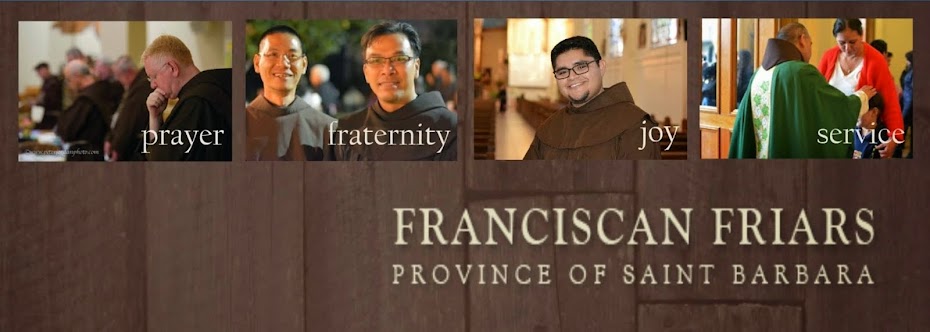We were created to live in perfect relationship with God and to care for others in perfect love (Mk 12:28-34). This relationship is often referred to as harmony or peace. When we fail, miss the mark, break our commitment to love, ignore justice, and fall into sin, it fractures our relationship with God and our brothers and sisters. God longs to heal those relationships.
The message of reconciliation preached by the Franciscans is one of "Good News". In the Bible, as strange as it sounds to modern ears, the word sin actually implied hope. If an action were condemned as sinful, then the person could repent, change the situation, and be made new. In a world that believed in the powers of fate controlled by gods and powers of earth, sin was a word that inferred the possibility of healing, repentance, and change. This was a radical message of the time; God created humanity and offered free will! This is the message of the Franciscan friars of the Province of Saint Barbara.
Pain, despair, and sinful situations are not the will of God. The New Testament presented the life, teaching, death, Resurrection of Jesus Christ, as well as his gift of the Church, as the means of grace to reconcile ourselves with God and with others. The Franciscan friars assist in maintaining and sharing this gift with the world, especially those on the margins.
In a special way, Jesus, through the action of our Franciscan priest, invites people to release the past, be forgiven and reject sin (Jn 8:11). Jesus bestowed on the Apostles and the Church the power to forgive and to liberate souls from the burden of sin through the sacrament of Penance and Reconciliation (Jn 20:23; 2 Cor 14-6:2). Our priest are known world-wide as graced-filled confessors.
While discerning our way of life you'll need to test your desire and abilities to promote reconciliation in the joyful and prophetic spirit of St. Francis of Assisi. Your trying to discover if you have the ability to become a bridge-builder and reconciler. Look for local opportunities to get involved in your community around issues of strained or broken relationships (minority groups vs. law enforcement; or homeless vs. downtown business owners, etc...).
As you volunteer or work in this field you'll need to become aware of the movements of consolation and desolation before, during, and after engaging in this work. As you reflect on your experience you'll ask: Did I experience desolation? Did I feel weary, dry and dissatisfied? Did I feel consolation? Did I feel cheerful and satisfied? Was I able to engage in these activities with a joyful and generous heart? These two movements well help reveal the movement of the Holy Spirit in your discernment process. Read the blog post "Consolation and Desolation" for more information on using this discernment tool.
Next, take your experiences and engage in theological reflection. Theological reflection is an essential ingredient in the process of spiritual discernment. It holds the possibility of discerning God's presence and/or direction. It's the process of standing before your experience 'open' to what may or may not be revealed through the lens of faith. Read the blog post "Theological Reflection" for more information on using this discernment tool.
Next, share you experiences with your spiritual director and/or vocation director. This person will listen to your story with an ear for the movement of the Holy, of the Divine. They will also help you discern between your voice, the world (family, culture, and society) and God's voice within your experiences and theological reflection. Read the blog post "Spiritual Direction" for more information on using this discernment tool.
Remember to be nourished by the Word and the Eucharist at Mass in order to be sent forth in mission to love and serve the Lord. Read the blog post "Freely You Have Received, Freely Give" for more information on why Mass is important for discernment.
Lastly, at this stage in the journey you are trying to put on the "habit" of becoming a reconciler . You're trying to see if you have the abilities and the desire to become a bridge-builder as a brother or priest. The work is not easy, but it's the love of God that sustains and nourishes us in this work.
Peace and all good,
Bro. Scott Slattum, OFM
Contact Information:
Franciscan Friars
Office of Vocations
1500 34th Ave.
Oakland, CA 94601
Phone: (408) 903-3422
Email: vocations@sbofm.org
Facebook: www.facebooks.com/SBFranciscans.Vocations
Twitter: www.twitter.com/OFMvocation
Website: www.sbfranciscans.org

